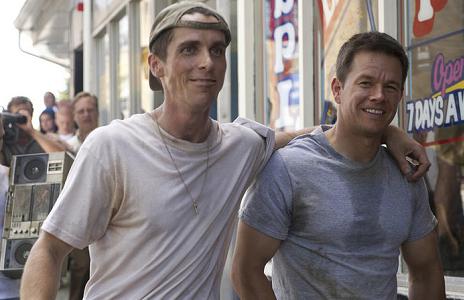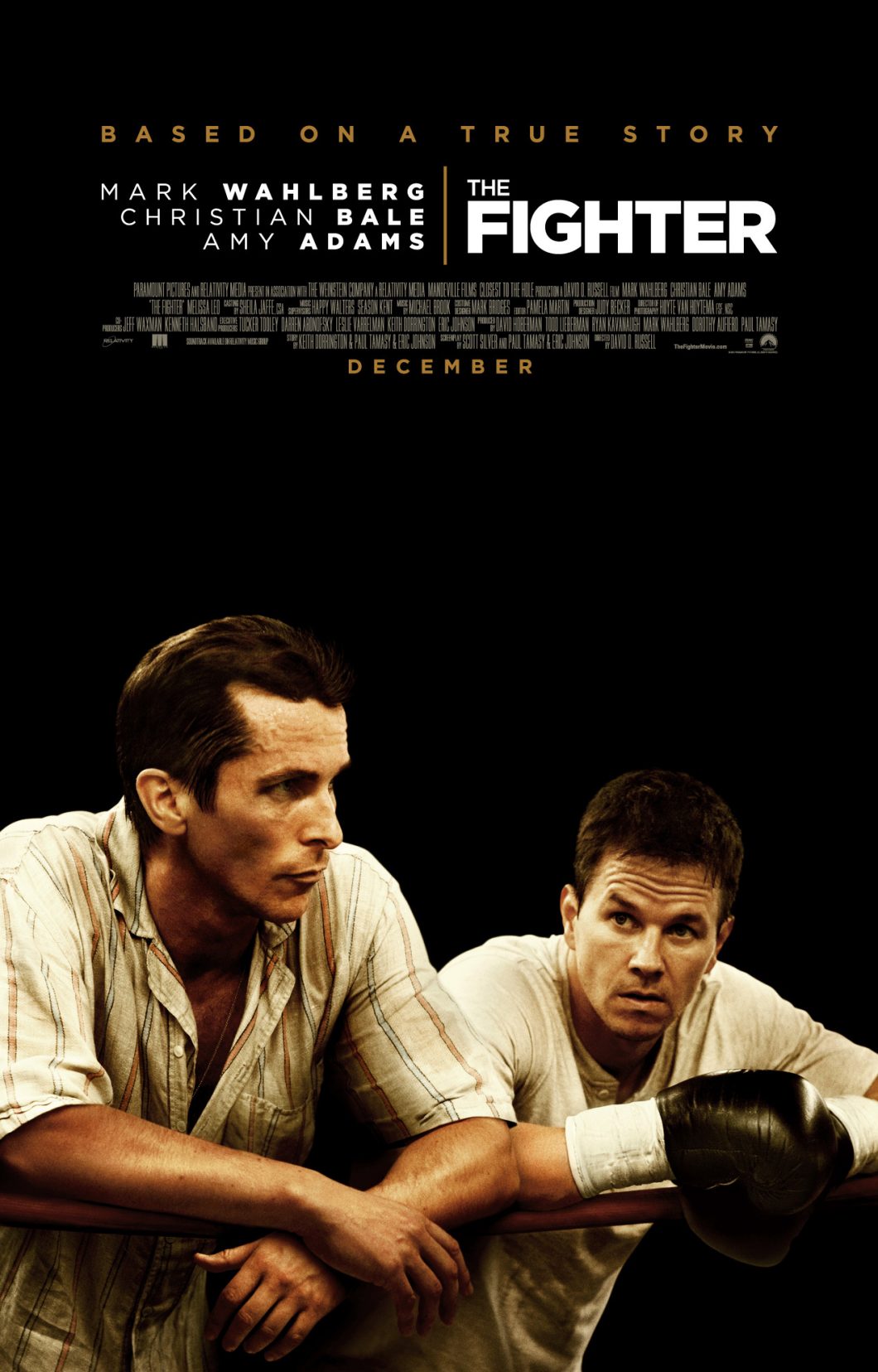Early on, “The Fighter” star/producer Mark Wahlberg approached Martin Scorsese to direct the film. Then Darren Aronofsky was attached for a while, but ended up stepping down, though he’s still credited as an executive producer. I’m going through this little bit of development history because the final film, which ended up being directed by David O. Russell, has much less in common with the latter’s previous work (including “Three Kings” and “i ♥ huckabees”, which featured Wahlberg) than with, say, Scorsese’s “Raging Bull” and Aronofsky’s “The Wrestler”.
Like “Raging Bull”, Russell’s film tells the real-life story of a a boxer from a working class background who, amongst other things, had to deal with a rocky relationship with his brother. That boxer is “Irish” Micky Ward (Wahlberg) who, at the time we catch up with him, seems to be wasting away his potential. Part of the blame has to go to his half-brother and trainer Dickie Eklund (Christian Bale), the onetime “Pride of Lowell” who, in 1978, actually knocked down Sugar Ray Leonard. At the time when the movie begins though, he hasn’t boxed professionally in nearly a decade, having instead gotten addicted to crack and involved in various criminal activities. Not the most reliable guy to have in your corner, right? Likewise, Micky could do better for a manager than his brash, trashy mother (Melissa Leo)…
He could be a contender (like Brando’s character in “On the Waterfront” never got to be) instead of a bum but for that, he might have to get rid of these two who seem to be dragging him down. Which leads to the central theme of “The Fighter”: where does family loyalty end? It’s heartbreaking stuff, really, even if you understand why Micky would want to keep Dickie, his ma and all the others away. To that end, he gets moral support from his feisty new girlfriend (Amy Adams), but by the time he gets a title shot, he can’t help but bring his brother, the one who taught him everything, who used to be his hero, back in his corner. Maybe this time it’ll work out? That’s where the drama lies, as much as in whether or not he’ll win the fight.
Boxing as catharsis, boxing as a way to redemption… Nothing we haven’t seen before, but it works, damn it, and I grew really involved with Ward’s story and rooted hard for him to finally come out a winner. Furthermore, “The Fighter” does somewhat feel different than many other movies in the genre because of its very realistic, gritty, intimate approach. Which is where the comparison with “The Wrestler” comes in. Like that film, “The Fighter” is not so much a sports drama as a character study, and what great characters we’ve got here! Dicky in particular is absolutely fascinating, especially as played by Bale in one of his absolute best performances. Not just because he lost a whole bunch of weight (again), transforming himself physically to be eerily convincing as a crack addict, but because of the way he manages to be charming and funny even though he’s a fuck-up, making you understand why it’s so hard for Micky to break away from him. It’s on the level of Samuel L. Jackson’s performance in “Jungle Fever”, high praise indeed.

As directed by David O. Russell from a screenplay by Scott Silver, Paul Tamasy and Eric Johnson, “The Fighter” impresses by its no-nonsense approach, by the way it flirts with melodrama but remains low-key enough to avoid it, by its blend of pathos and good-spirited humor, and by its shaggy, harsh, messy quality, perfectly appropriate considering the milieu it’s depicting, i.e. one of the toughest neighborhoods of Lowell, Massachusetts. There’s an unstaged, unpredictable feel to many of the scenes, particularly those involving a large part of the supporting cast, which includes Jack McGee as Micky’s dad, Mickey O’Keefe in his own role of a cop/gym owner, and the actresses playing Dickey and Micky’s seven sisters.
Another thing I found interesting is the way Russell and cinematographer Hoyte van Hoytema switch between various film stocks, specifically for the parts that replicate the look of the documentary that was made about Dicky, some Super 8 home movies, and the big fight scenes that are shot on Betacam and made to look like we’re watching actual TV broadcasts of them. Props as well to composer Michael Brook for his ambient, Brian Eno-like score, which is complemented by an awesome soundtrack featuring tracks by Led Zeppelin, The Rolling Stones, Aerosmith, Traffic, Red Hot Chili Peppers, Whitesnake, The Heavy and others, not to mention an oddly touching rendition of The Bee Gees’ I Started a Joke by Bale and Leo’s characters.
Chances are pretty good that “The Fighter” will be one of the frontrunners of the next Oscar race and that’d be okay by me. It’s hardly as visionary as something like “Black Swan”, “Inception” or whatnot, but it’s quality work all the way.

